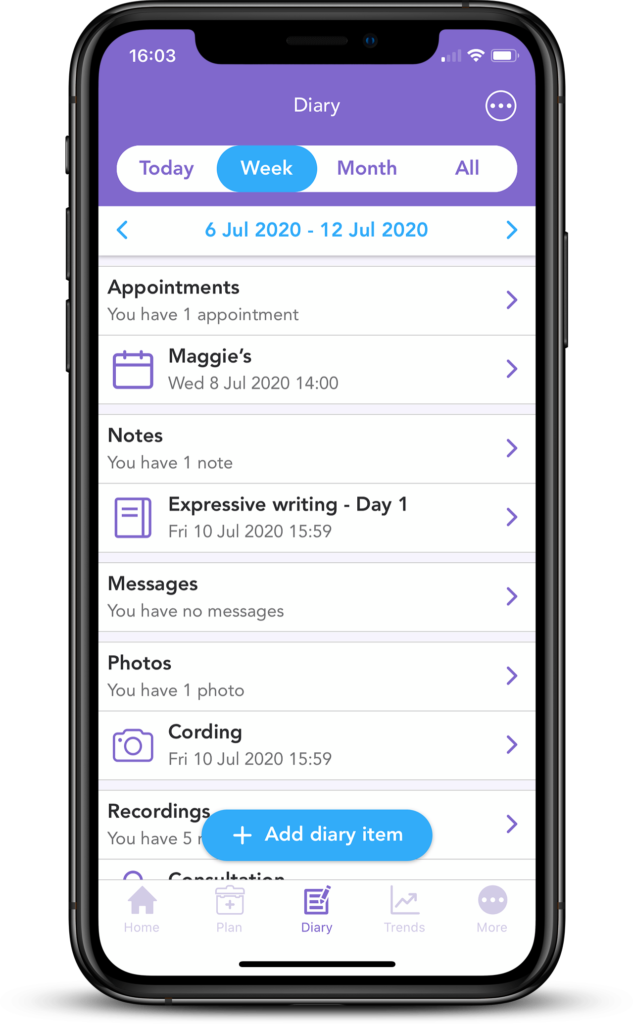
Guilt is a complex emotion: it can come in many different forms and can be experienced for a variety of different reasons in the context of cancer, as well as in other aspects of life. According to Dr. Brené Brown “shame is a focus on self, while guilt is a focus on behavior. Shame is ‘I am bad.’ Guilt is ‘I did something bad.’” Feeling guilty for something you cannot control such as cancer can be hugely overbearing. This can affect your wellbeing and quality of life and is definitely not something to be ignored.
Some of the reasons underlying cancer patients’ guilt include feeling they are a “burden” for their friends and family, thinking that they did not notice their cancer symptoms early enough to prevent it, or feeling guilty for surviving whilst others have not.
“Guilt isn’t always a rational thing. Guilt is a weight that will crush you whether you deserve it or not.”
Maureen Johnson
 If you are experiencing feelings of guilt, it’s important not to suppress them. Expressing your guilt is the first step in coming to terms and coping with it. Although talking to other people can be very helpful, sometimes you might not want to share how you feel for a number of reasons. Therefore, the question you might ask yourself is “How do I express all of these thoughts and emotions?”. There are numerous techniques that you can try; in this blog, we explore a form of writing therapy calling ‘expressive writing’ that can be used to channel your emotions on paper. A lot of people may be surprised by ‘the power of the pen’.
If you are experiencing feelings of guilt, it’s important not to suppress them. Expressing your guilt is the first step in coming to terms and coping with it. Although talking to other people can be very helpful, sometimes you might not want to share how you feel for a number of reasons. Therefore, the question you might ask yourself is “How do I express all of these thoughts and emotions?”. There are numerous techniques that you can try; in this blog, we explore a form of writing therapy calling ‘expressive writing’ that can be used to channel your emotions on paper. A lot of people may be surprised by ‘the power of the pen’.
What is expressive writing?
Expressive writing is a form of writing therapy pioneered by James W. Pennebaker in the late 1980s. It involves writing about strong thoughts and feelings for the same duration of time for a certain number of days (usually 15-20 minutes for four days). You simply write about what you feel in your mind and pay no attention to writing rules and conventions (that means no grammar police!).
“I developed a working theory that keeping a secret was a form of active inhibition. Concealing or holding back powerful emotions, thoughts, and behaviours, I reasoned, was itself stressful.”
Pennebaker conducted his first expressive writing experiment with college students. His instructions to the students were clear: write about traumas for 15 minutes a day for 4 days. Pennebaker found that students in the experimental writing group would visit the health centre less than half of the amount than the control group would1.
Since his initial studies, many have gone on to research Pennebaker’s findings further and those practicing expressive writing have found his writing technique immensely powerful.
Whilst there are limited studies on the effects of expressive writing on cancer outcomes, there have been studies that have shown an effect on quality of life (QoL). In a randomized control study, expressive writing that focused on one’s breast cancer (trauma and facts) led to improvements in QoL outcomes2.
How do I get started?
You may want to try Pennebaker’s technique to express emotions (such as guilt) that you are holding in. Here are some instructions and tips:
- Set a timer for 15 minutes.
- Just start writing and see what happens. Write down anything that is on your conscience.
- If you run out of things to write, repeat what you have written about until the time is up.
- Do not pay attention to sentence structure, punctuation or spelling. Write freely.
- Write at the same time each day (evening or at dawn is suggested to be best).
- Pick the right environment. Perhaps somewhere quiet and private.
- You may feel negative emotions immediately after writing, especially after the first session but this should go away after a few hours.
- After four days, reflect on your emotions and behaviours to see what effect it has had on you.
Why not have a go at it yourself? Write for 15 minutes per day for four consecutive days about any thoughts and feelings that you are having. You can always adjust these restrictions afterwards to see what you prefer. Some people also like to use this method as a journal to look back at later on.

If you are on the move, or you aren’t keen on writing you can always use your computer or smartphone. If you are worried about somebody accidentally seeing the things you write, you can also store notes securely in the OWise app and add a passcode lock in the app to prevent this. Alternatively, you can share these notes with your partner, family, friend or care team to communicate your thoughts and feelings through non-verbal means.
Let us know how you get on!
Read more
https://www.psychologytoday.com/gb/blog/write-yourself-well/201208/expressive-writing
https://splice-bio.com/expressive-writing-can-improve-your-mental-health/
Pennebaker, J. W. (2018). Expressive Writing in Psychological Science. Perspectives on Psychological Science, 13(2), 226–229.
References
-
Pennebaker, J. W., Beall, S. K. (1986). Confronting a traumatic event: Toward an understanding of inhibition and disease. Journal of Abnormal Psychology, 95, 274–281.
-
Craft MA, Davis GC, Paulson RM. (2013). Expressive writing in early breast cancer survivors. J Adv Nurs, 69(2), 305-315.
